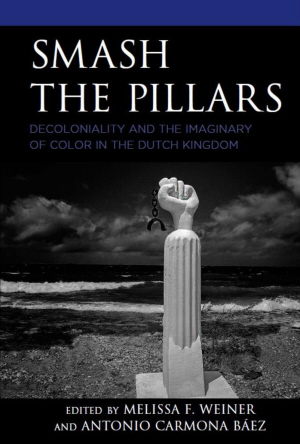29 juni, Amsterdam: presentatie van dekoloniaal boek “Smash the Pillars”

Op 29 juni organiseren New Urban Collective en The Black Archives een presentatie van het boek “Smash the Pillars: Decoloniality and the Imaginary of Color in the Dutch Kingdom”, met bijdragen van een indrukwekkende rij van dekoloniale auteurs en onder redactie van Melissa Weiner en Antonio Carmona Báez. Na de boekpresentatie vindt een Q&A-sessie plaats met BIJ1-duoraadslid Jazie Veldhuyzen.
Boekpresentatie
Vrijdag 29 juni
Van 19:00 tot 22:00 uur
Vereniging Ons Suriname
Zeeburgerdijk 19-a
Amsterdam
Facebook
Aanmelding via donatie (voor de opbouw van The Black Archives)
Naast Weiner en Carmona Báez hebben ook Artwell Cain, Jessica de Abreu, Teresa Maria Díaz Nerio, Mitchell Esajas, Quinsy Gario, Halleh Ghorashi, Francio Guadeloupe, Gloria Holwerda-Williams, Guno Jones, Lianne Leonora, Teresa E. Leslie, Egbert Alejandro Martina, Kwame Nimako, Patricia Schor, Jennifer Tosch, University of Colour en Gloria Wekker iets geschreven voor het boek.
“‘Smash the Pillars’ builds on and captures the efforts by scholars and activists to decolonize Dutch history and memory and resist the physical, epistemological, and psychological violence imposed by the Dutch state, its institutions, and dominant narratives”, aldus de oproep voor de boekpresentatie. “Contributions not only offer an unparalleled glimpse into decolonial activism in the Dutch kingdom but also provide us with a new lens with which to view contemporary decolonial efforts, from the towers of academia to the streets, from theoretical publications to anti-colonial consciousnesses. ‘Smash the Pillars’ embodies a sociological call for the re-thinking of Dutch society throughout its transatlantic kingdom, from the perspectives of non-White Dutch thinkers hailing from former colonies and territories of the Dutch kingdom. It interweaves existing strands of decolonial thinking with those rooted in Dutch (contemporary) history to produce an edited volume that makes visible the often invisible, by featuring and centering the spaces, voices and actions of those most excluded within Dutch society. Central to the book is the argument, developed holistically in the conclusion, that in order to fully decolonize Dutch society, the current social organization in the Kingdom of the Netherlands that relies on separate pillars for each religious and/or racial group, must be dismantled.”
Harry Westerink
